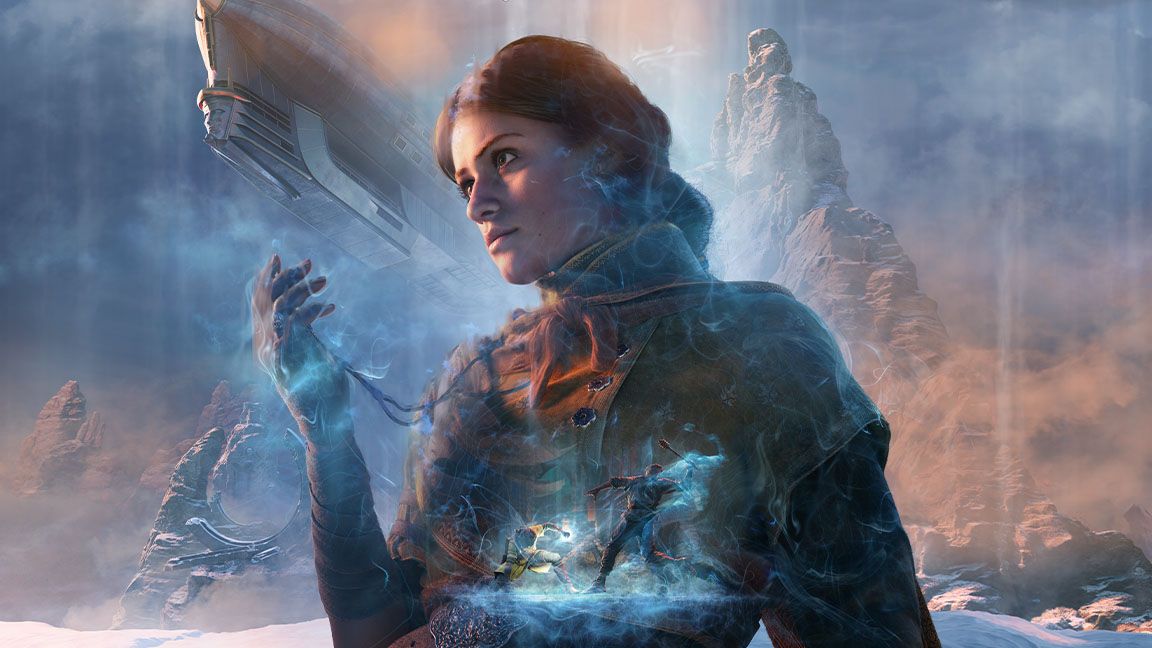Publisher Bandai Namco
Developer Reflector Entertainment
Formats PS5 (reviewed), Xbox Series X/S, PS4, PC
Platform Unreal Engine 4
Release 17 October
Unknown 9: Awakening recalls the diverse experimentation of PlayStation 2, when new tech would leverage ideas out of developers, when games like Psi Ops and Second Sight, while not perfect, offered unique game design. We’ve seen something similar from Remedy with Control, but in a generation when a lot of Triple-A games can feel too safe and too eager to follow the latest trend (hello Suicde Squad Kill The Justice League, Concord), the likes of Unknown 9, flaws and all, need to be cherished.
The game’s world is part of a larger transmedia project spanning comics, novels, web series and podcasts; each uncovers generational aspects of the same universe, following different characters and stories whose lives interconnect, in a similar vein to Ubisoft’s Assassin’s Creed. Who the immortal Unknown 9 are, how they get their powers and what it means for humanity is played out across a mix of media.
One of these stories is explored in Unknown 9: Awakening, and follows one ‘Quaestor’, Haroona, on her mission for revenge against Vincent Lichter, the man responsible for her mentor’s murder. It’s a story that is structurally familiar but has enough twists to keep you hooked, but the real draw of the narrative comes from seeing where developer Reflector is taking us next. The world of Unknown 9 goes to places few games depict – 1912 India – and a lavish Art Deco style that’s rarely touched upon.
Unknown 9: Awakening goes back to basics
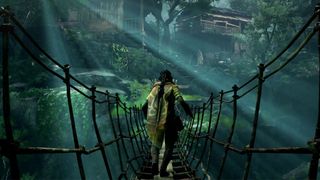
This is a strictly old-style narrative game, which means each level is a static but beautiful corridor of curated views and details. While there are destructible barrels and other objects, each location is a tightly directed run designed to build Unknown 9’s world. While there’s room to veer off track to unlock collectibles and files that reveal a little more of the world, each stage is here to tell a story and feed you into small open environments designed to let you experiment with the game’s mix of stealth and powered-combat.
The generally tight design and scripting is a reason why, despite being made on Unreal Engine 4, Unknown 9 looks beautiful. Each location is wonderfully detailed and elegantly designed with intricate period details, whether that’s the ornate interior of an airship that becomes Haroona’s floating base of operations or the various castles, mansions and tombs you’ll explore, each area of Unknown 9 has been lovingly crafted.
The directed nature of each level does mean there are very ‘gamesy’ elements that many modern games try to massage away or mask; evenly grown patches of grass signal a place to hide? White chalk on a ledge? That’s a place to climb. Potted walls are ripe for climbing and scurrying up.
Yet it’s a structure that means Reflector can craft its world and push you to see and absorb the things it wants you to dwell upon, and some of these, particularly in the game’s later stages, are strikingly eye-catching. Regularly vast canyon vistas impress but it’s the design of the Unknown 9 statues and temple architecture that really impresses, and include graceful, towering monoliths and figures. Everything is directed, with circular environmental motifs eagerly framing areas of the world Reflector wants you to notice. As world building goes, Unknown 9 is lovely.
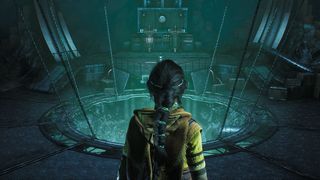
When not seeking to tell its story, Unknown 9 funnels you into semi-open areas that let you flex Haroona’s mix of powers and stealth. Early on this can feel limited and old-fashioned, as you hide in grass for sneak attacks or set off gas canisters to cause distractions or death, but as you build Haroona’s skill path eventually these areas become playgrounds to toy and tease the enemy.
‘Stepping’ is a core mechanic, here Haroona can take control of an enemy for a limited time to attack others, switch off machinery or ignite canisters to set traps. ‘Shroud’ turns Haroona invisible, ‘Push’ and ‘Pull’ enable her to throw enemies about a level, and ‘Crush’ can destroy objects, such as oil lamps to set an area alight. Combining everything, particularly once upgraded to extend her time in Shroud or ‘Step into’ multiple enemies and Push and Pull groups of soldiers, really livens up how you play Unknown 9 and evokes the heady days of PS2 silliness.
It’s hard not to smile when an overpowered Haroona can Step into a group of enemies, have them attack one another, set off fires and explosions, dodge an attack and counter, Pull a helpless enemy of a ledge for a knockout blow, Push another off a cliff and then fire a flurry of Umbric strikes at an armoured enemy to power a fatal blow, all in one sequence. Combat is tactical and encourages experimentation, but more importantly great fun.
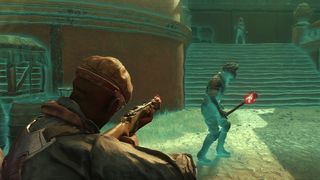
When Reflector pursues its narrative into The Fold, a mysterious alternate dimension that holds the answers Haroona’s looking for, as well as the story’s Big Bad, cracks in the game’s long gestating development become apparent. Moments in The Fold feel less impactful in UE4, and show the weaknesses of this older tech. These stages play out largely as walking sims, like otherworldly exposition dumps that force the narrative on; hardly a bad idea, but here there’s not enough to interact with, leaving you a spectator and not an active participant in Haroona’s journey.
At other times Unknown 9 feels particularly last-gen with occasional frame rate stutter and slow down when the screen fills with enemies and pyrotechnics.
Yet, though the limits of UE4 are evident in areas and Unknown 9 is strictly old-fashioned, focused narrative adventure in the vein of the excellent A Plague Tale, any shortfalls are massaged away by the game’s chaotic combat, meaningful performances – particularly from Anya Chalotra in the role of Haroona – and striking art direction; the environment work in Unknown 9 really is beautifully realised.
Unknown 9 Awakening goes to new places
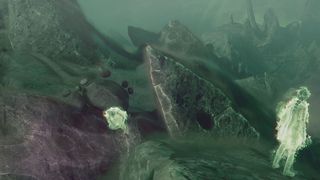
The game’s art direction is a triumph, and demonstrates how a strong vision and coherent visual design can overcome any technical shortfalls. The environment design and period detail, as mentioned, is beautifully achieved and regularly impresses; helped somewhat by a setting we rarely see in video games – pre-WW1 India, the sandy deserts of Mauritania and Gothic Portugal.
The design extends to Unknown 9’s characters, which do repeat, but often surprise. While basic fodder offers a glimpse of the horrors to come in World War 1, some of the more outrageous creations, such as the heavy gunner who looks like a demonic amalgam of sparking lost and found machinery, a mish-mash of mechanical, industrial components, is refreshingly original.
With a focus on its narrative, Unknown 9 can feel too narrow at times, and it’s a solid 10 hour run, but the game’s combat comes alive in the later stages. While some technical hiccups can dampen the joy, the inventive art direction lifts Unknown 9 above feeling like a run-of-the-mill last-gen adventure. A swansong for Unreal Engine 4? Possibly, and while not perfect, Unknown 9 is a reminder how one or two strong ideas, a consistent and inventive vision and fun, can be more important than following trends.
